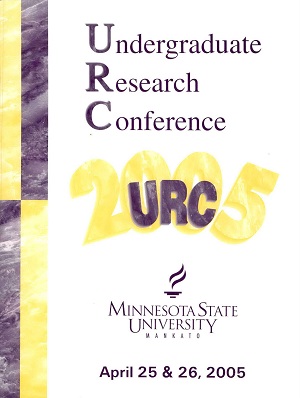Microcomputed Tomographic Analysis of Renal Microvascular Structure in Aging Rats
Location
CSU 255
Start Date
25-4-2005 1:15 PM
End Date
25-4-2005 3:15 PM
Student's Major
Biological Sciences
Student's College
Science, Engineering and Technology
Mentor's Name
Michael Bentley
Mentor's Department
Biological Sciences
Mentor's College
Science, Engineering and Technology
Second Mentor's Name
Jane Reckelhoff
Second Mentor's Department
Biological Sciences
Second Mentor's College
Science, Engineering and Technology
Description
Aging patterns of the kidney have been shown to be associated with the progressive decline in renal blood flow and glomerular filtration rate while plasma flow increases. The observed changes imply vascular alterations in the kidney. To evaluate the microvascular as the kidney ages, microcomputed tomography was utilized to obtain three-dimensional images of kidneys from 4 young Sprague- Dawley rats and 8 old Sprague-Dawley rats. The three-dimensional image data for the young and old Sprague-Dawley rat kidneys was then analyzed with the program ANALYZE 6.O. Quantitative analysis was performed, including measurements of glomerular diameter, glomerular density, vascular volume fraction, and total glomerular number. The diameters of the glomeruli were significantly larger in the old rat kidneys, as compared to the young rat kidneys. Significantly fewer glomeruli were present in the older kidneys than in the younger kidneys. The decrease in number of glomeruli coupled with an increase in overall organ volume shows a significant decrease in the glomerular density for the old kidneys. The changes seen in the kidneys indicate that as the kidney ages, nephron units disappear. The loss of nephron units initiates a shift in single nephron function, which suggests that the glomerular units within the nephron are undergoing a compensatory hypertrophy to counterweigh effect of the decreased number of functional units. The kidney analysis performed accounts for the increase in single nephron glomerular filtration rate and plasma flow increases as well as the progressive decline in renal blood flow and glomerular filtration rate seen as the kidney ages.
Microcomputed Tomographic Analysis of Renal Microvascular Structure in Aging Rats
CSU 255
Aging patterns of the kidney have been shown to be associated with the progressive decline in renal blood flow and glomerular filtration rate while plasma flow increases. The observed changes imply vascular alterations in the kidney. To evaluate the microvascular as the kidney ages, microcomputed tomography was utilized to obtain three-dimensional images of kidneys from 4 young Sprague- Dawley rats and 8 old Sprague-Dawley rats. The three-dimensional image data for the young and old Sprague-Dawley rat kidneys was then analyzed with the program ANALYZE 6.O. Quantitative analysis was performed, including measurements of glomerular diameter, glomerular density, vascular volume fraction, and total glomerular number. The diameters of the glomeruli were significantly larger in the old rat kidneys, as compared to the young rat kidneys. Significantly fewer glomeruli were present in the older kidneys than in the younger kidneys. The decrease in number of glomeruli coupled with an increase in overall organ volume shows a significant decrease in the glomerular density for the old kidneys. The changes seen in the kidneys indicate that as the kidney ages, nephron units disappear. The loss of nephron units initiates a shift in single nephron function, which suggests that the glomerular units within the nephron are undergoing a compensatory hypertrophy to counterweigh effect of the decreased number of functional units. The kidney analysis performed accounts for the increase in single nephron glomerular filtration rate and plasma flow increases as well as the progressive decline in renal blood flow and glomerular filtration rate seen as the kidney ages.
Recommended Citation
Lalich, Ian and Michelle Taylor. "Microcomputed Tomographic Analysis of Renal Microvascular Structure in Aging Rats." Undergraduate Research Symposium, Mankato, MN, April 25, 2005.
https://cornerstone.lib.mnsu.edu/urs/2005/poster-session-B/5




